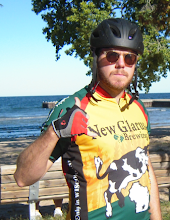Sunday, August 29, 2010
Where have you gone, Zommer?
It seems like June, July and August have just been a blur. And a short one at that. It doesn't help that summers in the Netherlands never rise much above 80F - this year was no different - so though we had about a week of "heat", in that way it's almost as if the season never happened at all.
Now as August is on its last legs, the weather oscillates between beautiful, sunny ('sparkly' as Katie likes to say) fall-like cool splendor and cloudy, cold and wet depression. But hey, that's Holland for you. I'll take the sparkly days I can get.
A great many things have happened since I last wrote, weeks ago. One of the greatest, and the reason I'll be able to afford to stay in the Netherlands for at least a little while longer, is I was offered a full-time editor position at the Amsterdam magazine I've been interning at since April. I'd be lying if I said this hadn't been a far-off hope of mine - that they'd offer me something more serious - but things being as they are I wasn't really expecting anything beyond perhaps the opportunity to be a contributing writer. But here we are. And no offense to Nordstrom, but I'm really excited to add the job experience of 'intern-managing copy editor' to my resume. Look out, Boilen and Glass, I'll be knocking on your door soon enough.
With that, here's a piece I wrote for the August issue's 'Worth Leaving Town For' section:
This month, the bantamweight town of Zeist – situated right outside of Utrecht, just a 45-kilometre jaunt from Amsterdam – transforms into a musical heavy-hitter. For two weeks, it is hosting scores of conservatory students and professional musicians who will perform in chamber music concerts for the public. The goal, according to artistic director Alexander Pavlovsky, is to open up the chamber and let in a fresh breeze.
‘Many young people think that classical music is boring and depressing,’ says Pavlovsky. ‘But there are many lessons we can learn from classical music for our lives. We just have to find a way to bring them in and make them interested in what we do.’
Pavlovsky and organisers of the Stichting Zeister Muziekdagen, the foundation behind the festival, are bringing in a talented, youthful cadre of ensembles and packing the programme with a nice variety of composers, from Romanian folk dances to jazz-inspired preludes. Reduced ticket prices for anyone under the age of 28 won’t hurt either.
Although chamber music is often a string-heavy genre, Pavlovsky has invited several players of stringless instruments to perform. Clarinettist Paul Meyer will join the Warsaw-based Szymanowski Quartet for a Brahms clarinet feature, for example. Pianist Robert Kulek signs on with Pavlovsky’s own Jerusalem Quartet for Schumann’s ‘Piano Quintet in E flat’; and the Amsterdam Concertgebouw’s oboist Alexei Ogrintchouk will perform on the ‘Fantasy Quartet’ by Benjamin Britten and the ‘Oboe Quartet in F’ by Mozart.
The Szymanowski Quartet will also bow in with lively pieces by Haydn and Mendelssohn, adding a contemporary flourish to the bill with works from Argentinean tango composer Astor Piazzolla and the group’s Polish namesake: composer Karol Szymanowski – both from the early 20th century.
‘It’s our responsibility to play the current music to see what’s good, interesting,’ said Grzegorz Kotów, one of Szymanowski’s two violinists, ‘and then show the audience there’s something new to discover.’
Pavlovsky and friends haven’t neglected very young patrons, either. The Dutch Matangi Quartet, known for its genre-blending crossover projects, should cater to the kiddies (the programme notes indicate it’s good for age six and under) performing Claude Debussy’s lyrical ‘Children’s Corner’ suite. They’ve made their efforts transparent: they want to prove that chamber music can be as entertaining and attractive as any genre, to any audience.
Although it dates back to medieval times, the back-and-forth, intimately collaborative nature of chamber performance keeps it very current, says Kotów. ‘It is really a mirror of our lives,’ he says. ‘In a quartet, four living people are sitting there playing music, and they are discussing, talking with each other.’
Subscribe to:
Posts (Atom)




